‘Selfish, stupid’ COVID protesters get short shrift in Wellington
Residents express increasing frustration with group of a few hundred occupying areas near parliament for a second week.
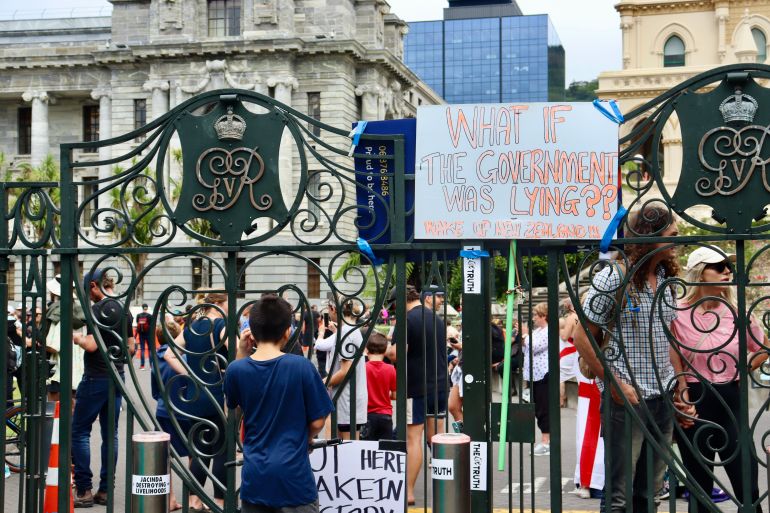
Wellington, New Zealand – Despite warnings of heavy rain as a result of Cyclone Dovi, protests against the government’s pandemic measures are entering a second week in New Zealand’s capital, as frustration grows among city residents.
Wellington has faced traffic delays and closed streets since February 8 as protesters – inspired by the so-called ‘freedom convoy‘ in Canada – parked cars, vans, and buses in the capital as part of an effort to occupy parliament’s lawn.
Keep reading
list of 4 itemsFears for Māori as New Zealand opens up amid Omicron wave
Ardern moves to relax New Zealand’s tough border controls
New Zealand PM Ardern postpones wedding amid Omicron curbs
Charlotte Hall, 33, works at a vintage designer store in the city.
She says life was already difficult for the retail industry because people were working from home and “feeling unsure about going out, or what’s in store for the future” and the protesters have made it worse.
Vaccinated because she does not want to get COVID-19, Hall says she has “no issue” with the government and its COVID-19 policies.
“They’re doing everything they can in the circumstances and we haven’t had the number of lockdowns that we’ve seen overseas,” Hall said. “The restrictions that are in place aren’t new or unique, they’re happening everywhere because people are literally dying.”
The protesters, who now number a few hundred, are “selfish, ignorant, stupid, and unworldly,” she says.
Police are continuing to monitor and contain activity at parliament grounds, Wellington District Commander Corrie Parnell says.
“Police have identified a range of different causes and motivations among the protesters, making it difficult to open clear and meaningful lines of communication.”
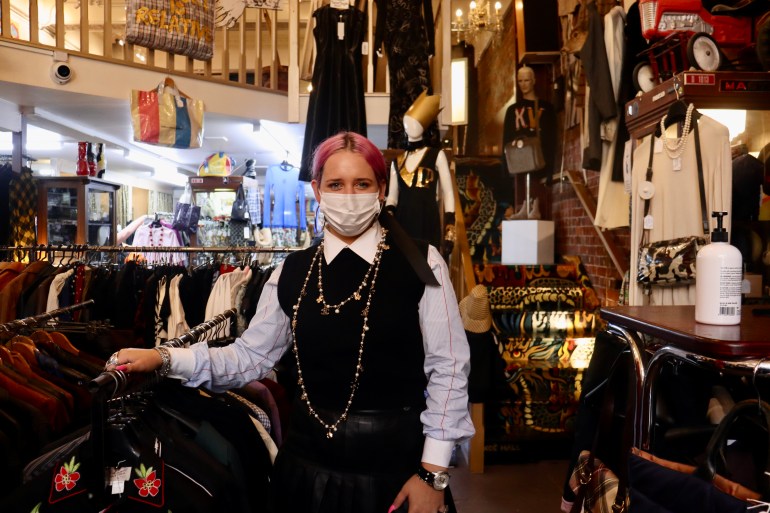
Some 122 people were arrested on Thursday when police tried to clear the area. All are facing charges of wilful trespass and could face a maximum sentence of three months in prison or a 1,000 New Zealand dollar ($662) fine.
Wellington City Council has issued more than 100 parking violations, but the amount of resources needed to do so and the effectiveness of the response was up for consideration, spokesperson Richard MacLean told Al Jazeera.
“We’re realising that tickets are having little impact. Roads around parliament remain blocked and buses have had to be diverted. We’re now concerned about the conditions at parliament – which are appalling and unhygienic,” MacLean said.
“The impact on businesses in the vicinity is becoming desperate and there are lots and lots of complaints from Wellingtonians. There’s no doubt they’re wanting this to stop.”
‘The Kiwi way’
There were 4,057 cases of coronavirus confirmed on February 14. New Zealand has reported just less than 20,000 cases and 53 deaths since the pandemic began, with other countries of a similar size reporting far higher cases and deaths.
Hall is worried the protesters will spread COVID-19 in Wellington.
“They’re not vaccinated. They’re in big crowds, unmasked, and they’re not the type of people to get tested. They’re also going to supermarkets to get supplies and the rest of Wellington goes there,” she said.
“I thought it would have fizzled out by now but they seem to be having too much fun. I’ve seen videos of them dancing to Bob Marley, it’s like they’re at a festival. It makes sense in a way because they can’t go anywhere if they’re not vaccinated so they’re socialising.
“Just five percent of the population isn’t vaccinated. They say ‘it’s not the Kiwi way’ to be forced to do anything, but 95 percent are vaccinated, which suggests it’s the Kiwi way to do so, evidently.”
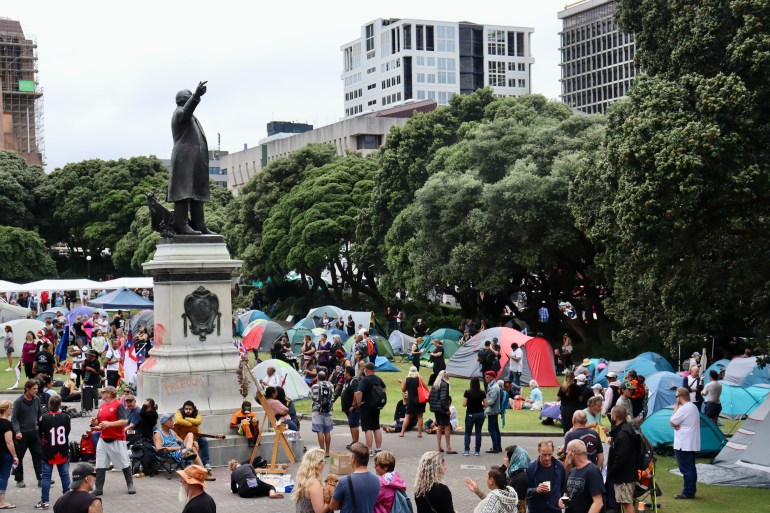
Wellington local Tane Morris feels frustrated that the protesters are getting so much attention.
“The protesters are the minority but they’ve got the loudest voices,” he said. “There needs to be a space for dissenting opinions, but you have to question whether it’s harmful?
“The whole point of the mandates and vaccinations is to fast-track a process where we can travel freely and safely, and live in a world where we don’t have to wear masks. We all want to enjoy those freedoms. We’ll get there but we have to be vigilant and patient.”
John* is a local business owner and is scared of the protesters. He knows businesses that have closed and some that are scared to open because they worry about the safety of their staff.
“Traffic has been slow on that side of town, which is my usual route home. I also think the overt presence of the freedom protesters is intimidating and people are afraid to approach or be near it.”
There is an arrogance to the protest, he says.
“It feels selfish as they aren’t thinking about the well-being of others – like the disabled, immune compromised, or elderly. Mandates are not just about restricting the small minority of people who are anti vaxx – but looking after the well-being of the whole community.”
‘I don’t need a jab’
Nicky Booth travelled more than six hours from the town of Cambridge to join the protest because she “wants our country to be the democratic country that I grew up in. I want my freedom, that means no mandates, no mandatory vaccinations, freedom to travel, and freedom to gather.”
She says she plans to occupy the area until their demands to drop the pandemic restrictions have been met. The support worker had taken the week off to come to the protest and will be staying “for as long as it takes”.
She’s not opposed to vaccinations but she doesn’t want to be forced to put a “poisonous chemical” into her body.
“I’m getting treated like a social pariah, I can’t go to the library in my town, pay my bills, go to my local swimming pool or go to cafes. I feel passionate about being in control of my body and my health and I feel I’m being discriminated against because of my medical choices.
“I’m of the age where I’m fit and healthy. I don’t catch the flu, I don’t need a jab.”
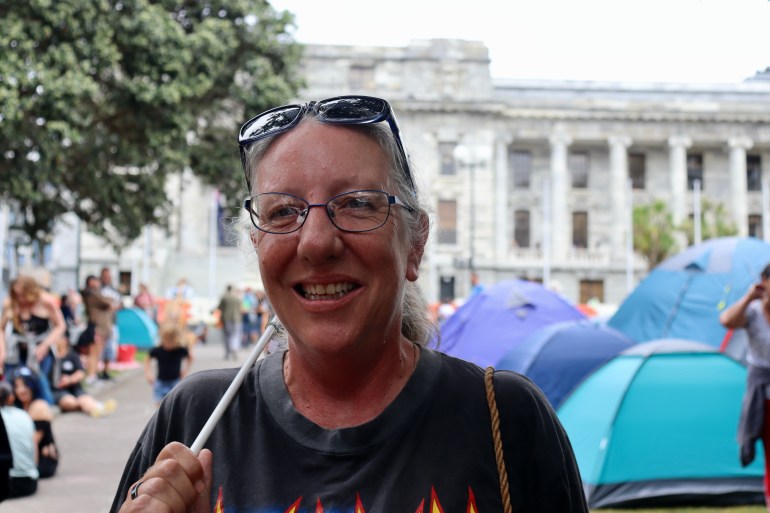
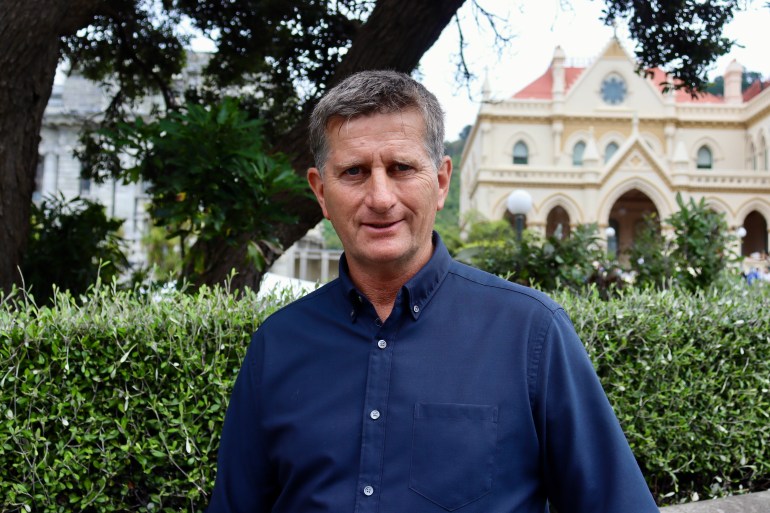
Fellow protester Leighton Baker was originally vaccine hesitant but now proclaims he is vaccine adamant. “I should be able to choose what I put in my body. The government has total control and that’s grating for a lot of people. What’s worse is that they’re refusing to talk to us.
“I want the government to take accountability. People are really frustrated and angry. People want to be heard and they should be heard in a democratic society.”
Contrary to popular belief, the protest has been incredibly peaceful, he says. “Police have made arrests but to what end? We’ve been standing our ground, not retaliating. Just look around you.”
No politicians have spoken to the protesters as the government is focused on preparations for the Omicron variant of coronavirus, Jacinda Ardern told Al Jazeera.
“People have the right to protest but when that tips into affecting business, people’s ability to move, the ability of kids to go to school or the ability of emergency services to move around obviously the police have to manage that.
“Obviously every New Zealander has a right to protest, but there are also rules around what is able to happen on parliament’s forecourt and of course we would expect that people have behaviours that don’t disrupt the ability of others to go on with their lives as well.”